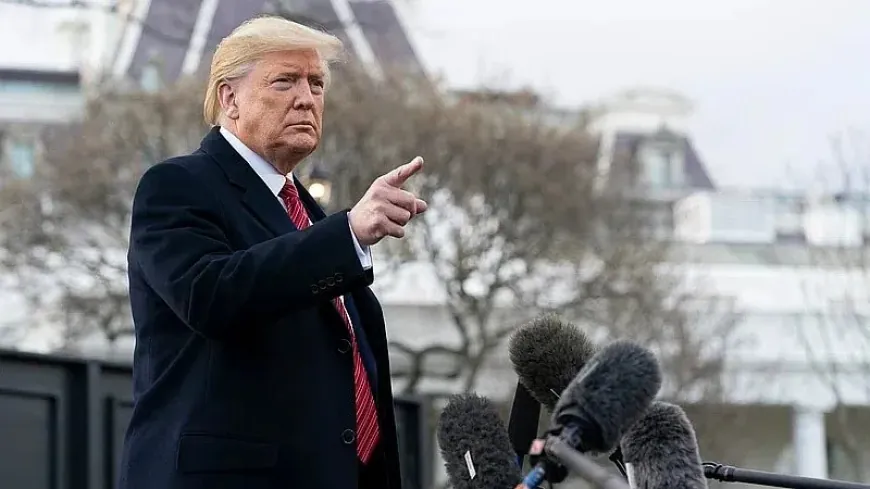Trump Files $15B Defamation Lawsuit Against NYT and Penguin Random House
President Trump sues NYT and Penguin Random House for $15B over 2024 book and election articles he claims defamed him.

President Donald J. Trump filed a $15 billion defamation lawsuit against The New York Times Co. and Penguin Random House on Monday, claiming the organizations published false and politically motivated material that damaged his reputation and personal brand. The suit also names four reporters as defendants: Susanne Craig, Russ Buettner, Peter Baker, and Michael S. Schmidt.
Trump’s filing alleges that the Times has a “decades-long pattern of intentional and malicious defamation” against him, targeting his career, personal life, and political influence. According to the lawsuit, the publication of a 2024 book and three pre-election articles “intentionally misrepresented facts” to undermine his credibility and influence public perception in the 2024 presidential race.
Legal experts say this is one of the largest defamation claims ever filed in the U.S., underscoring Trump’s continued willingness to use the courts to challenge mainstream media outlets.
Trump Sues Over 2024 Book and Articles
The complaint focuses on a book released in 2024 and three Times articles published ahead of the November 2024 election. Trump alleges these publications falsely portrayed his policies, business dealings, and personal conduct. While he does not legally challenge the Times’ editorial endorsements, he criticizes them in the filing as part of a broader pattern of political bias.
Trump estimates that the defamatory content caused damage to his “one-of-a-kind, unprecedented personal brand,” which he values at over $100 billion. He is seeking both compensatory damages to recoup reputational harm and punitive damages intended to hold the defendants accountable for what he calls a deliberate pattern of media misconduct.
Legal analysts note that Trump is framing the suit not only as a personal claim but also as a statement against perceived liberal media bias, potentially signaling a broader strategy to intimidate or influence reporting on his administration and affiliated political initiatives.
Times Denounces the Lawsuit
The New York Times responded swiftly, calling the lawsuit “without merit.” A spokesperson said, “It lacks any legitimate legal claims and instead is an attempt to stifle and discourage independent reporting. The New York Times will not be deterred by intimidation tactics.”
The Times emphasized that its reporting on Trump has adhered to journalistic standards, including careful verification of facts and multiple source corroboration. Penguin Random House, the publisher of the 2024 book, did not immediately respond to requests for comment.
This response underscores the longstanding tension between Trump and media organizations, highlighting the challenges public figures face when attempting to pursue defamation claims in high-profile political contexts.
Trump Publicizes Lawsuit on Social Media
Trump announced the filing on Truth Social, accusing the Times of a “decades-long method of lying about your Favorite President (ME!), my family, business, the America First Movement, MAGA, and our Nation as a whole.” He framed the lawsuit as a continuation of his campaign to protect his brand and counter what he describes as systematic media bias.
Trump announced the lawsuit on Truth Social, telling his followers that the Times had engaged in a “decades long method of lying” about him, his family, and the America First movement. His post also repeated claims that mainstream outlets were working with Democrats to damage his presidency.
Trump’s Past Media Lawsuits
This lawsuit is the latest in a series of actions Trump has pursued against news organizations. In July 2025, he sued Dow Jones & Co., News Corp., and Rupert Murdoch for $10 billion over a Wall Street Journal story alleging he sent a suggestive birthday letter to Jeffrey Epstein.
Trump has also reached settlements in previous media cases. Paramount Global settled a defamation claim in July, and ABC agreed to contribute $15 million to his presidential foundation or museum in December 2024. However, Trump has faced setbacks, including a Manhattan judge dismissing his suit against journalist Bob Woodward over recordings from his first term, and a 2009 loss in a $5 billion libel case against Timothy O’Brien of the Times.
These legal battles illustrate Trump’s consistent willingness to litigate against major media companies and the mixed outcomes he has experienced over the years, providing context for the current filing.
High Bar for Trump to Prove Defamation
Under the 1964 Supreme Court ruling in New York Times Co. v. Sullivan, public figures like President Trump must prove that a defendant knowingly published false information or acted with reckless disregard for the truth to succeed in a libel case. Historically, few public figures have won high-profile defamation lawsuits because courts require clear evidence of intent or recklessness.
In past cases, Trump has struggled to meet this standard. For example, his 2009 libel suit against journalist Timothy O’Brien, which sought $5 billion over claims questioning his wealth, was dismissed. Legal analysts say this precedent will shape how the court evaluates the current $15 billion claim against the Times and Penguin Random House, particularly given the political context and the role of the articles and book in public discourse.
Case Details and Filing Information
The lawsuit, officially titled Trump v. New York Times Company, 8:25-cv-02487, was filed Monday in the U.S. District Court for the Middle District of Florida, based in Tampa. President Trump is seeking $15 billion in damages, citing both compensatory and punitive claims.
According to the filing, the Times and the book’s authors “engaged in a coordinated effort to misrepresent [Trump’s] actions, damage his reputation, and influence public opinion ahead of the 2024 election.” The complaint also lists four reporters—Susanne Craig, Russ Buettner, Peter Baker, and Michael S. Schmidt—as defendants, making this one of the largest defamation suits targeting journalists in U.S. history.
Court documents cite three New York Times articles published before the 2024 election and passages from the Penguin Random House book as evidence of false statements about Trump’s business practices, policy decisions, and personal conduct. The lawsuit alleges that these publications presented misleading information with the intent to harm the president’s reputation and influence voters’ perceptions ahead of the election.
Also Read: Judge Blocks Trump from Firing Fed Governor Lisa Cook































































